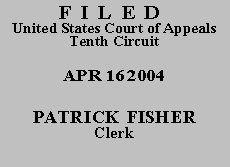

Plaintiffs-Appellants,
v.
MAJOR GENERAL KOSTER; LT. COL. HOLLADY; COL. YOUNG; CPT. RIGGS; CPT. MICHLES; LT. WILLIAM RUSTY CALLEY; UNITED STATES OF AMERICA,
Defendants,
PT. MICHAEL TERRY,
Defendant-Appellee.
Plaintiffs appeal from the district court's order awarding attorney's fees and costs in favor of defendant Michael B. Terry. We affirm.
The parties are familiar with the facts, and we will summarize them only briefly. On October 3, 2002, Terry moved for an award of attorney's fees and costs. The district court heard arguments on the attorney-fee issue. Finding that plaintiffs had acted in bad faith in their interactions with Terry, it entered an order awarding attorney's fees and costs to Terry in the amount of $12,055.50, from which the plaintiffs filed an amended notice of appeal.
Although Terry had requested that the district court award fees and costs against both plaintiffs and their attorneys, S. Austin Johnson and Johnson Law Firm P.C. (hereafter referred to collectively as "Johnson"), the district court's order did not specify whether it was plaintiffs or Johnson who are responsible for the attorney's fees and costs. In any event, Johnson did not file an appeal in his own name from the award of attorney's fees and costs.
Nearly a year later, in December 2003, Terry filed a motion asking the district court to clarify that its order awarding fees and costs ran against Johnson as well as plaintiffs, and that Johnson was jointly and severally liable for the fees and costs. On January 14, 2004, the district court granted Terry's motion to clarify and amended its previous order to state that plaintiffs and Johnson are jointly and severally liable for the $12,055.50 awarded to Terry for fees and costs. Johnson did not appeal from this order.
1. Johnson's failure to appeal
Plaintiffs' notice of appeal from the order imposing attorney's fees and costs failed to name Johnson as a party. Johnson did not appeal from the district court's later order clarifying Johnson's responsibility for the fees and costs. We therefore lack jurisdiction to review the attorney fee and cost awards against Johnson. See Jane L. v. Bangerter, 61 F.3d 1505, 1513 n.3 (10th Cir. 1995).
2. Plaintiffs' appeal
The district court awarded fees to Terry under its inherent power to sanction conduct that abuses the judicial process. While "the so-called 'American Rule' prohibits fee shifting in most cases . . . a court may assess attorney's fees when a party has acted in bad faith, vexatiously, wantonly, or for oppressive reasons." Chambers v. NASCO, Inc., 501 U.S. 32, 45-46 (1991) (quotation omitted). We review the district court's award of fees under this "bad faith exception" for an abuse of discretion. United States v. McCall, 235 F.3d 1211, 1216 (10th Cir. 2000). "The bad faith exception is drawn very narrowly and may be resorted to only in exceptional cases and for dominating reasons of justice." Id. (quotation omitted).
The district court explained the reasons for its award of attorney's fees and costs to Terry as follows:
Based on [their] representations [in the letter to Terry], plaintiffs obtained a default judgment against an unrepresented Mr. Terry. In effect, plaintiffs conspired with an unsuspecting Mr. Terry to obtain a judgment that, despite plaintiffs' suggestions, was completely personal and individual to Mr. Terry. At oral argument, plaintiffs' counsel . . . stated that plaintiffs' intent was to help Mr. Terry. Plaintiffs' actions did not help Mr. Terry in any way but led him to incur legal bills in excess of ten thousand dollars. Plaintiffs' scheme and treatment of Mr. Terry can only be described as bad faith, oppressive, and beyond the boundaries of appropriate litigation practices.
Aplt. App., No. 03-4041, at 99.
Plaintiffs advance the following arguments in opposition to the district court's findings: (1) they did not mislead the court in their arguments concerning the default judgment; (2) the letter to Terry was written by an associate of the Johnson firm who was later fired for writing letters without Johnson's knowledge; (3) they did not conspire with Terry to obtain a judgment; (4) they never counseled Terry to default in the case, and in fact sought a default judgment against him only when he failed to respond to their attempts to communicate with him; and (5) their intention was to offer Terry a stipulated judgment that would protect him from any personal liability.
Upon review, having considered these arguments and reviewed the record in light of the applicable standards, we conclude that the district court did not abuse its discretion in awarding attorney's fees and costs to Terry. We therefore affirm the order of the district court awarding attorney's fees and costs.
Entered for the Court
Circuit Judge
*. This order and judgment is not binding precedent, except under the doctrines of law of the case, res judicata, and collateral estoppel. The court generally disfavors the citation of orders and judgments; nevertheless, an order and judgment may be cited under the terms and conditions of 10th Cir. R. 36.3.